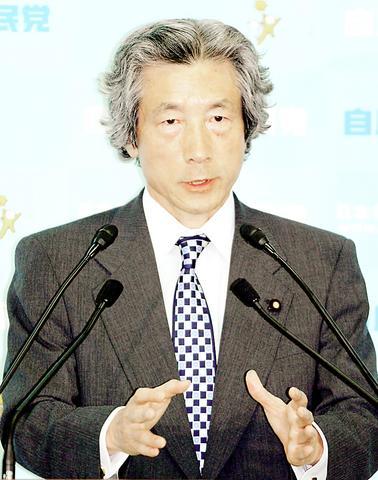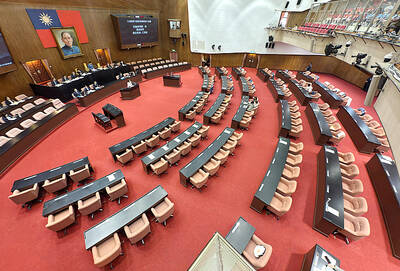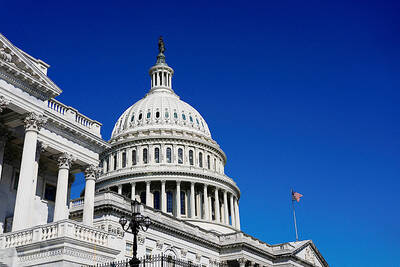Japanese Prime Minister Junichiro Koizumi vowed yesterday to push ahead with his reform agenda despite suffering a setback in elections seen as a verdict on unpopular policies on Iraq and pensions.
Koizumi's Liberal Democratic Party (LDP), which has ruled Japan almost uninterruptedly for nearly 50 years, won 49 of the 121 seats contested in Sunday's upper house election, a net loss of just one seat.
The main opposition Democratic Party of Japan (DPJ) won 50 seats, up from 38 before the election.

PHOTO: AFP
However, Koizumi's ruling coalition retained its majority in the upper house after its coalition partner, the New Komei party, won 11 seats. It also holds a majority in the more powerful lower chamber of parliament, which chooses the prime minister.
Newspaper editorials described the results as a slap down for an "arrogant" Koizumi by voters who were angry he had failed to explain the planned overhaul of the creaking pension system and the decision to keep troops in Iraq deployed since December.
But senior members of the ruling party, who have expressed frustration at Koizumi's high-handed management style, expressed support after last week suggesting a poor election result could see him deposed as premier.
Koizumi said he would not change course on key policy initiatives. He promised to keep up the structural reform of the economy and said Japan would maintain the contingent of troops doing reconstruction work in southern Iraq.
"I believe the public is calling for the ruling coalition to work with the opposition to push for our reform agenda," Koizumi told reporters, saying his reforms were responsible for the current economic recovery.
But analysts warned that he could be punished more severely next time unless he speeds up the reform process.
Koizumi could be forced to resign or dissolve the lower house in next summer and call a snap election, in which the Democrats could win power, said political analyst Minoru Morita.
"I think it will be difficult for him to last two more years," added Yoshiaki Kobayashi, political science professor at Keio University.
Koizumi acknowledged that a majority of Japanese opposed his decision to keep troops in Iraq as part of a multinational force, but he insisted it was the right thing to do.
"Japan needs to continue activities which will be regarded as valued work there," he said.

The Chien Feng IV (勁蜂, Mighty Hornet) loitering munition is on track to enter flight tests next month in connection with potential adoption by Taiwanese and US armed forces, a government source said yesterday. The kamikaze drone, which boasts a range of 1,000km, debuted at the Taipei Aerospace and Defense Technology Exhibition in September, the official said on condition of anonymity. The Chungshan Institute of Science and Technology and US-based Kratos Defense jointly developed the platform by leveraging the engine and airframe of the latter’s MQM-178 Firejet target drone, they said. The uncrewed aerial vehicle is designed to utilize an artificial intelligence computer

The Chinese Nationalist Party (KMT) caucus yesterday decided to shelve proposed legislation that would give elected officials full control over their stipends, saying it would wait for a consensus to be reached before acting. KMT Legislator Chen Yu-jen (陳玉珍) last week proposed amendments to the Organic Act of the Legislative Yuan (立法院組織法) and the Regulations on Allowances for Elected Representatives and Subsidies for Village Chiefs (地方民意代表費用支給及村里長事務補助費補助條例), which would give legislators and councilors the freedom to use their allowances without providing invoices for reimbursement. The proposal immediately drew criticism, amid reports that several legislators face possible charges of embezzling fees intended to pay

REQUIREMENTS: The US defense secretary must submit a Taiwan security assistance road map and an appraisal of Washington’s ability to respond to Indo-Pacific conflict The US Congress has released a new draft of the National Defense Authorization Act (NDAA), which includes up to US$1 billion in funding for Taiwan-related security cooperation next year. The version published on Sunday by US House of Representatives Speaker Mike Johnson removed earlier language that would have invited Taiwan to participate in the US-led Rim of the Pacific Exercise (RIMPAC). A statement on Johnson’s Web page said the NDAA “enhances U.S. defense initiatives in the Indo-Pacific to bolster Taiwan’s defense and support Indo-Pacific allies.” The bill would require the US secretary of defense to “enable fielding of uncrewed and anti-uncrewed systems capabilities”

Renewed border fighting between Thailand and Cambodia showed no signs of abating yesterday, leaving hundreds of thousands of displaced people in both countries living in strained conditions as more flooded into temporary shelters. Reporters on the Thai side of the border heard sounds of outgoing, indirect fire yesterday. About 400,000 people have been evacuated from affected areas in Thailand and about 700 schools closed while fighting was ongoing in four border provinces, said Thai Rear Admiral Surasant Kongsiri, a spokesman for the military. Cambodia evacuated more than 127,000 villagers and closed hundreds of schools, the Thai Ministry of Defense said. Thailand’s military announced that